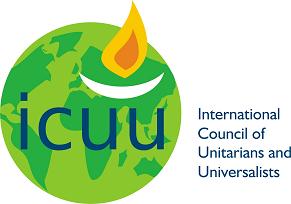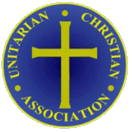| Look up Unitarian or unitarian in Wiktionary, the free dictionary. |
| Look up Unitarianism or unitarianism in Wiktionary, the free dictionary. |
Unitarian or Unitarianism may refer to:
| Look up Unitarian or unitarian in Wiktionary, the free dictionary. |
| Look up Unitarianism or unitarianism in Wiktionary, the free dictionary. |
Unitarian or Unitarianism may refer to:
A Unitarian is a follower of, or a member of an organisation that follows, any of several theologies referred to as Unitarianism:

The International Council of Unitarians and Universalists (ICUU) is an umbrella organization founded in 1995 comprising many Unitarian, Universalist, and Unitarian Universalist organizations. Some groups represent only a few hundred people; while the largest, the Unitarian Universalist Association, had more than 160,000 members as of May 2011—including over 150,000 in the United States.
Universalism is the philosophical and theological concept that some ideas have universal application or applicability.

Unitarian Universalism (UU) is a liberal religion characterized by a "free and responsible search for truth and meaning". Unitarian Universalists assert no creed, but instead are unified by their shared search for spiritual growth, guided by a dynamic, "living tradition". Currently, these traditions are summarized by the Six Sources and Seven Principles of Unitarian Universalism, documents recognized by all congregations who choose to be a part of the Unitarian Universalist Association. These documents are "living", meaning always open for revisiting and reworking. Unitarian Universalist (U.U.) congregations include many atheists, agnostics, and theists and have churches, fellowships, congregations, and societies around the world. The roots of Unitarian Universalism are in protestant liberal Christianity, specifically unitarianism and universalism. Unitarian Universalists state that from these traditions comes a deep regard for intellectual freedom and inclusive love. Congregations and members seek inspiration and derive insight from all major world religions.
Unitarianism is a nontrinitarian Christian theological movement that believes that the God in Christianity is one singular person. Most other branches of Christianity define God as one being in three persons: the Father, Son, and Holy Spirit. Unitarian Christians believe that Jesus was inspired by God in his moral teachings and that he is a savior, but he is not God incarnate.

William Ellery Channing was the foremost Unitarian preacher in the United States in the early nineteenth century and, along with Andrews Norton (1786–1853), one of Unitarianism's leading theologians. Channing was known for his articulate and impassioned sermons and public speeches, and as a prominent thinker in the liberal theology of the day. His religion and thought were among the chief influences on the New England Transcendentalists although he never countenanced their views, which he saw as extreme. His espousal of the developing philosophy and theology of Unitarianism was displayed especially in his "Baltimore Sermon" of May 5, 1819, given at the ordination of the theologian and educator Jared Sparks (1789–1866) as the first minister of the newly organized First Independent Church of Baltimore.
Many Wikipedia articles on religious topics are not yet listed on this page. If you cannot find the topic you are interested in on this page, it still may already exist; you can try to find it using the "Search" box. If you find that it exists, you can edit this page to add a link to it.
The General Assembly of Unitarian and Free Christian Churches is the umbrella organisation for Unitarian, Free Christians, and other liberal religious congregations in the United Kingdom and Ireland. It was formed in 1928, with denominational roots going back to the Great Ejection of 1662. Its headquarters is Essex Hall in central London, on the site of the first avowedly Unitarian chapel in England, set up in 1774.

Nontrinitarianism is a form of Christianity that rejects the mainstream Christian doctrine of the Trinity—the belief that God is three distinct hypostases or persons who are coeternal, coequal, and indivisibly united in one being, or essence. Certain religious groups that emerged during the Protestant Reformation have historically been known as antitrinitarian.

Liberal Christianity, also known as Liberal Theology, and historically as Christian Modernism, is a movement that interprets Christian teaching by taking into consideration modern knowledge, science and ethics. It emphasizes the importance of reason and experience over doctrinal authority. Liberal Christians view their theology as an alternative to both atheistic rationalism and theologies based on traditional interpretations of external authority.
In Christian theology, universal reconciliation is the doctrine that all sinful and alienated human souls—because of divine love and mercy—will ultimately be reconciled to God. The doctrine has been rejected by most mainstream Christian churches, which tend to maintain at least the possibility that many are not saved, but it has received support from many prestigious Christian thinkers as well as many groups of Christians. It has been argued that the Bible itself has a variety of verses that seem to support a plurality of views.
The American Unitarian Association (AUA) was a religious denomination in the United States and Canada, formed by associated Unitarian congregations in 1825. In 1961, it consolidated with the Universalist Church of America to form the Unitarian Universalist Association.

The Universalist Church of America (UCA) was originally a Christian Universalist religious denomination in the United States. Known from 1866 as the Universalist General Convention, the name was changed to the Universalist Church of America in 1942. In 1961, it consolidated with the American Unitarian Association to form the Unitarian Universalist Association.

Trinitarian universalism is a variant of belief in universal salvation, the belief that every person will be saved, that also held the Christian belief in Trinitarianism. It was particularly associated with an ex-Methodist New England minister, John Murray, and after his death in 1815 the only clergy known to be preaching Trinitarian Universalism were Paul Dean of Boston and Edward Mitchell in New York.

The Unitarian Christian Association (UCA) is a relatively small, though growing fellowship of Christians who feel an affinity with traditional Unitarianism and Free Christianity. The association is based in the United Kingdom and is an affiliated society of the General Assembly of Unitarian and Free Christian Churches, and has formal links with the European Liberal Protestant Network.
In Britain, the term Free Christian refers specifically to individual members and whole congregations within the General Assembly of Unitarian and Free Christian Churches.
Biblical unitarianism encompasses the key doctrines of nontrinitarian Christians who affirm the Bible as their sole authority, and from it base their beliefs that God the Father is one singular being, and that Jesus Christ is God's son but not divine. The term "biblical Unitarianism" is connected first with Robert Spears and Samuel Sharpe of the Christian Life magazine in the 1880s. It is a neologism that gained increasing currency in nontrinitarian literature during the 20th century as the Unitarian churches moved away from mainstream church traditions and, in some instances in the United States, towards merger with Universalism. It has been used since the late 19th century by conservative Christian Unitarians, and sometimes by historians, to refer to scripture-fundamentalist Unitarians of the 16th–18th centuries.

Christian universalism is a school of Christian theology focused around the doctrine of universal reconciliation – the view that all human beings will ultimately be saved and restored to a right relationship with God. Christian universalism and the belief or hope in the universal reconciliation through Christ can even be understood as synonyms. Opponents of this school, who hold that eternal damnation is the ultimate fate of some or all people, are sometimes called "infernalists."
Unitarianism, as a Christian denominational family of churches, was first defined in Poland-Lithuania and Transylvania in the late 16th century. It was then further developed in England and America until the early 19th century, although theological ancestors are to be found as far back as the early days of Christianity. It matured and reached its classical form in the middle 19th century. Later historical development has been diverse in different countries.